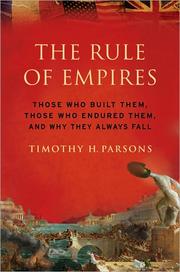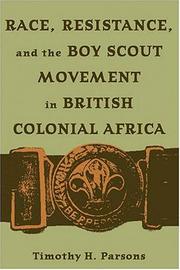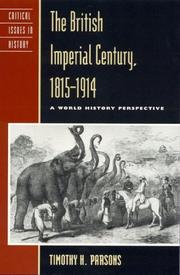| Listing 1 - 10 of 29 | << page >> |
Sort by
|

ISBN: 1282544098 9786612544095 0199719594 9780199719594 9780195304312 0195304314 9780199931156 0199931151 9780190254698 0190254696 9781282544093 6612544090 Year: 2010 Publisher: Oxford, [England] ; New York : Oxford University Press,
Abstract | Keywords | Export | Availability | Bookmark
 Loading...
Loading...Choose an application
- Reference Manager
- EndNote
- RefWorks (Direct export to RefWorks)
In The Rule of Empires, Timothy Parsons gives a sweeping account of the evolution of empire from its origins in ancient Rome to its most recent twentieth-century embodiment. He explains what constitutes an empire and offers suggestions about what empires of the past can tell us about our own historical moment. Parsons uses imperial examples that stretch from ancient Rome, to Britain's ""new"" imperialism in Kenya, to the Third Reich to parse the features common to all empires, their evolutions and self-justifying myths, and the reasons for their inevitable decline. Parsons argues that far from
Colonies --- Colonization --- Imperialism --- History.

ISBN: 0821441450 9780821441459 0821415956 9780821415955 0821415964 9780821415962 0821415956 9780821415955 Year: 2004 Publisher: Athens, Ohio Ohio University Press
Abstract | Keywords | Export | Availability | Bookmark
 Loading...
Loading...Choose an application
- Reference Manager
- EndNote
- RefWorks (Direct export to RefWorks)
Conceived by General Sir Robert Baden-Powell as a way to reduce class tensions in Edwardian Britain, scouting evolved into an international youth movement. It offered a vision of romantic outdoor life as a cure for disruption caused by industrialization and urbanization. Scouting's global spread was due to its success in attaching itself to institutions of authority. As a result, scouting has become embroiled in controversies in the civil rights struggle in the American South, in nationalist resistance movements in India, and in the contemporary American debate over gay rights.
Scouting (Youth activity) --- Scouts and scouting --- Youth --- Colonies --- Social life and customs --- Great Britain --- Race relations --- History. --- Administration. --- Scouts (Youth organization members) --- Colonies.

ISBN: 0847688259 Year: 1999 Publisher: Lanham, Md Rowman & Littlefield
Abstract | Keywords | Export | Availability | Bookmark
 Loading...
Loading...Choose an application
- Reference Manager
- EndNote
- RefWorks (Direct export to RefWorks)
History of the United Kingdom and Ireland --- anno 1800-1899 --- anno 1900-1909 --- anno 1910-1919
Book
ISBN: 0080176038 0080176046 Year: 1973 Publisher: Oxford Pergamon Press
Abstract | Keywords | Export | Availability | Bookmark
 Loading...
Loading...Choose an application
- Reference Manager
- EndNote
- RefWorks (Direct export to RefWorks)
Marine ecology. --- Marine plankton. --- Primary productivity (Biology). --- Marine ecology --- Marine plankton --- Primary productivity (Biology) --- Primary production (Biology) --- Biological productivity --- Photosynthesis --- Phytoplankton --- Marine organisms --- Plankton --- Biological oceanography --- Marine ecosystems --- Ocean --- Aquatic ecology --- Ecology --- Océanographie --- Océanographie --- Biomathematique
Book
ISBN: 9781107166035 9781316694312 9781316617281 Year: 2016 Publisher: Cambridge Cambridge University Press
Abstract | Keywords | Export | Availability | Bookmark
 Loading...
Loading...Choose an application
- Reference Manager
- EndNote
- RefWorks (Direct export to RefWorks)
"How did empires rule different peoples across vast expanses of space and time? And how did small numbers of imperial bureaucrats govern large numbers of subordinated peoples? Empires and Bureaucracy in World History seeks answers to these fundamental problems in imperial studies by exploring the power and limits of bureaucracy. The book is pioneering in bringing together historians of antiquity and the Middle Ages with scholars of post-medieval European empires, while a genuinely world-historical perspective is provided by chapters on China, the Incas and the Ottomans. The editors identify a paradox in how bureaucracy operated on the scale of empires and so help explain why some empires endured for centuries while, in the contemporary world, empires fail almost before they begin. By adopting a cross-chronological and world-historical approach, the book challenges the abiding association of bureaucratic rationality with 'modernity' and the so-called 'Rise of the West'"-- "The book is pioneering in bringing together historians of antiquity and the Middle Ages with scholars of post-medieval European empires, while a genuinely world-historical perspective is provided by chapters on China, the Incas and the Ottomans. The editors identify a paradox in how bureaucracy operated on the scale of empires and so help explain why some empires endured for centuries while, in the contemporary world, empires fail almost before they begin"--
Imperialism --- Bureaucracy --- History / world. --- History.
Book
ISBN: 9780742520516 074252051X 1442235292 9781442235298 9780742520509 0742520501 Year: 2014 Publisher: Lanham Rowman & Littlefield Publishers
Abstract | Keywords | Export | Availability | Bookmark
 Loading...
Loading...Choose an application
- Reference Manager
- EndNote
- RefWorks (Direct export to RefWorks)
At its peak, the British Empire spanned the world and linked diverse populations in a vast network of exchange that spread people, wealth, commodities, cultures, and ideas around the globe. At the turn of the twentieth century, this empire, which made Britain one of the premier global superpowers, appeared invincible and eternal. This compelling book reveals, however, that it was actually remarkably fragile. Noted historian Timothy H. Parsons uses vivid detail to tell the story of how Africans, Asians, Arabs, and West Indians brought about the unexpected demise of the seemingly invincible and
Imperialism --- History. --- Great Britain --- Commonwealth countries --- Colonies
Book
ISBN: 1316723461 1316694313 131671926X 1107166039 1316617289 Year: 2016 Publisher: Cambridge : Cambridge University Press,
Abstract | Keywords | Export | Availability | Bookmark
 Loading...
Loading...Choose an application
- Reference Manager
- EndNote
- RefWorks (Direct export to RefWorks)
How did empires rule different peoples across vast expanses of space and time? And how did small numbers of imperial bureaucrats govern large numbers of subordinated peoples? Empires and Bureaucracy in World History seeks answers to these fundamental problems in imperial studies by exploring the power and limits of bureaucracy. The book is pioneering in bringing together historians of antiquity and the Middle Ages with scholars of post-medieval European empires, while a genuinely world-historical perspective is provided by chapters on China, the Incas and the Ottomans. The editors identify a paradox in how bureaucracy operated on the scale of empires and so help explain why some empires endured for centuries while, in the contemporary world, empires fail almost before they begin. By adopting a cross-chronological and world-historical approach, the book challenges the abiding association of bureaucratic rationality with 'modernity' and the so-called 'Rise of the West'.
Imperialism --- Bureaucracy --- Interorganizational relations --- Political science --- Public administration --- Organizational sociology --- History.

ISBN: 0973164883 0973164875 Year: 2004 Publisher: Victoria, BC : Ecco Nova Editions,
Abstract | Keywords | Export | Availability | Bookmark
 Loading...
Loading...Choose an application
- Reference Manager
- EndNote
- RefWorks (Direct export to RefWorks)
Oceanographers --- Océanographes --- Biography. --- Biographies --- Parsons, Timothy Richard,
Digital
ISBN: 9781316694312 Year: 2016 Publisher: Cambridge Cambridge University Press
Abstract | Keywords | Export | Availability | Bookmark
 Loading...
Loading...Choose an application
- Reference Manager
- EndNote
- RefWorks (Direct export to RefWorks)
Book
ISBN: 3319779567 3319779559 Year: 2019 Publisher: Cham : Springer International Publishing : Imprint: Palgrave Macmillan,
Abstract | Keywords | Export | Availability | Bookmark
 Loading...
Loading...Choose an application
- Reference Manager
- EndNote
- RefWorks (Direct export to RefWorks)
This interdisciplinary collection of essays focuses on the ways in which movements of people across natural, political, and cultural boundaries shape identities that are inexorably linked to the geographical space that individuals on the move cross, inhabit, and leave behind. As conflicts over identities and space continue to erupt on a regular basis, this book reads the relationship between migration, identity, and space from a fresh and innovative perspective. Tabea Linhard is Professor of Spanish, Comparative Literature, and International Studies at Washington University in St. Louis, USA. Timothy H. Parsons holds a joint appointment as Professor of African History in the History Department and the African and African American Studies Department at Washington University in St. Louis, USA.
International relations. --- Migration. --- Citizenship. --- Human Geography. --- Comparative politics. --- Political theory. --- International Relations Theory. --- Comparative Politics. --- Political Theory. --- Anthropo-geography --- Anthropogeography --- Geographical distribution of humans --- Social geography --- Anthropology --- Geography --- Human ecology --- Birthright citizenship --- Citizenship --- Citizenship (International law) --- National citizenship --- Nationality (Citizenship) --- Political science --- Public law --- Allegiance --- Civics --- Domicile --- Political rights --- Coexistence --- Foreign affairs --- Foreign policy --- Foreign relations --- Global governance --- Interdependence of nations --- International affairs --- Peaceful coexistence --- World order --- National security --- Sovereignty --- World politics --- Administration --- Civil government --- Commonwealth, The --- Government --- Political theory --- Political thought --- Politics --- Science, Political --- Social sciences --- State, The --- Comparative political systems --- Comparative politics --- Government, Comparative --- Political systems, Comparative --- Law and legislation --- Emigration and immigration --- Social aspects.. --- Emigration and immigration. --- Human geography. --- Immigration --- International migration --- Migration, International --- Population geography --- Assimilation (Sociology) --- Colonization
| Listing 1 - 10 of 29 | << page >> |
Sort by
|

 Search
Search Feedback
Feedback About UniCat
About UniCat  Help
Help News
News